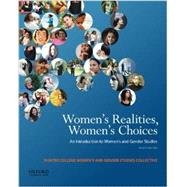This landmark text introduces readers to the field of women's studies by analyzing the contradictions between social and cultural "givens" and the realities that women face in society. Written collectively by nine authors from various disciplines, Women's Realities, Women's Choices, Fourth Edition, has been updated to incorporate the latest research and statistics in the field. Covering the most recent developments in politics, labor, family life, religion, and culture, the book also features extensive research on relevant social issues, such as the impact of the post-Soviet world on women's lives, the experience of homosexuality in family life, and the effects of economic globalization on women worldwide. Examining women as individuals, as family members, and as a force in the greater social fabric, Women's Realities, Women's Choices remains the most timely, comprehensive, and compelling introduction to the field of women's studies.
New to This Edition
* An updated conceptual organization
* A focus on transnational feminism and globalization
* An entire chapter devoted to intersectionality and differences among women
* Updates to every chapter, reflecting changes in the field and in the world








